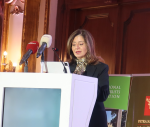You are here
The better half
Mar 11,2018 - Last updated at Mar 11,2018
When my better half and I came to sign our marriage certificate, I wanted to include in it a clause giving her equal right of divorce, which women do not have in Sharia courts. I was almost universally declared a certifiable lunatic for it because, people explained, women are too capricious to be entrusted with such a responsibility. Yet, these same people trust women to raise their children.
So, women do not have equal right of divorce, but surely they are better off today than before. Today there are women prime ministers, judges, surgeons and university professors, and we may even live to see women driving cars in Saudi Arabia.
Does this mean that the fight for gender equality is obsolete? Sadly, not, according to the World Economic Forum’s Global Gender Gap Index, which measures the world’s progress towards gender equality.
The 2017 report analysed 144 countries in terms of health and survival, educational attainment, economic participation and opportunity and political representation. It concluded, for the 6th year running, that the best country for women to live in is Iceland.
Iceland is the world's first country to make it illegal to pay men more than women for the same work. Other countries in the top 10 category include Rwanda, where women constitute 63.8 per cent of parliament, Nicaragua, where women make up over 40 per cent of lawmakers, senior officials, and managers and Slovenia, where the maternal mortality rate is 9 deaths per 100,000, compared to the global average of 216 deaths.
At the other end of the spectrum are countries where most, if not all, Cabinet ministers, legislators, senior officials and managers are men, there are no non-discrimination laws that mandate equal opportunities in employment and equal pay for the same work, women do not have the same rights as men in marriage or after divorce, and daughters do not have equal inheritance rights.
Remarkably, women raise their children to believe that this is right, because this outlook is entrenched in tradition. In Tunisia, when former president Habib Bourguiba introduced reforms that included promoting gender equality in the 1950s, he faced opposition even from women. But there is progress. When the democratically-elected Ennahda Party sought to reverse these reforms in 2011, they failed and had to step down.
So, are things getting better for women overall? The global resurgence of populism, xenophobia and exclusivism suggests the opposite because these movements base their legitimacy on defending tradition.
One example is Turkish President Recep Tayyip Erdogan's statement that a woman’s life is incomplete if she fails to reproduce at least three children.
Far more serious, was the restoration of the Mexico City Policy, which requires NGOs to pledge not perform or promote abortions anywhere in the world as a condition for receiving US funds. NGOs that refuse are reportedly denied all health assistance, including for HIV, primary care, nutrition, tuberculosis and malaria programmes. And this is presented as a pro-life choice.
Tradition is a wonderful way of romanticising the past, but it is not a good roadmap for the future.












